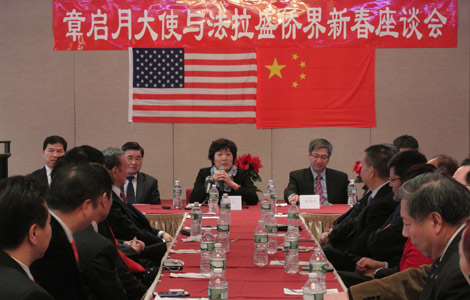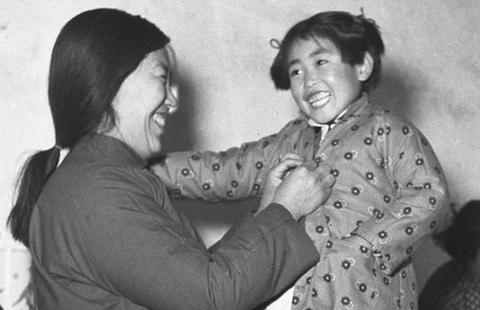CCTV's New Year's Gala goes global
Updated: 2015-02-10 11:40
By Paul Welitzkin in New York(China Daily USA)
|
|||||||||
China's central broadcaster will license extravaganza free of charge
China is taking its famous New Year's Gala television show to an international audience for the first time, as analysts said the country is eager to inform the West about its culture and economic progress.
State broadcaster China Central Television (CCTV), which has broadcast the Spring Festival Gala (also known as Chunwan) on the eve of the Lunar New Year annually since 1984, will license the rights to foreign television stations for free.
This global campaign for Chunwan also includes selected programs from previous galas and three gala-themed documentaries, which will be telecast in English, Hindi, Portuguese and other languages across 24 television networks in 16 countries.
The programs will also be launched via social media platforms such as YouTube, Google Plus and Twitter to reach an expected 230 countries and regions, said Ma Runsheng, assistant to the president of China International Television Corp.
"Our purpose is to give overseas Chinese and foreigners who are interested in Chinese culture a chance to see Chunwan," Ma said.
Xu Xin, associate director of the China and Asia-Pacific Studies Program at Cornell University in Ithaca, New York, said in an interview that the Chinese New Year is the most important holiday in the country. He believes CCTV is mainly making show available for Chinese who live abroad.
"In my view, CCTV wants to reach the Chinese population that lives overseas - people like me," he said. "They also want to help expand the Chinese culture to new audiences, particularly in the US."
"As China's economy and role in the world have grown, its culture is something the rest of the globe should know about," said Joseph Weber, a professor of journalism at the University of Nebraska in Lincoln, who has taught at Tsinghua University in Beijing. "I expect that CCTV officials feel they have a good story to tell that would interest viewers well beyond its borders."
YouTube, Google Plus and Twitter are not available in China.
"You need to reach the audience where the audience is," Weber said. "If potential viewers are users of YouTube and Twitter, it seems reasonable for Chinese authorities to use those vehicles. Of course, it would be helpful if all Chinese citizens had access to those sites as well. The more avenues of communication ... open to Chinese citizens and to others around the world, the better," he wrote in an e-mail.
"Social networks are a popular way to communicate overseas, so I think it's only natural that CCTV would seek to reach as large an audience as possible," said Xu.
According to statistics from CSM Media Research, more than 700 million people watched Chunwan live on TV in 2014, and another 100 million watched it online.
Even with those impressive numbers, Jonathan M. Hall, a professor of media studies at Pomona College in Claremont, California, said the gala has less importance in China than it used to.
"CCTV's foreign promotion of the show speaks both to China's growing efforts to become a cultural exporter and to the increasing domestic irrelevance of this media mishmash," Hall said. "Even though Chinese nationalism is on the upswing, the domestic need for such unifying programs has diminished greatly as Chinese media reflect the individuation of entertainment.
"TV also doesn't appeal as much as the luxury of the new multiplexes or the personal convenience of the Internet," he said. "Many Chinese might not appreciate the comparison, but we saw a similar phenomenon in the decline of Japan's Kohaku Utagassen New Year variety show from the 1990s onwards," he wrote in an e-mail.
Xu of Cornell said the television show is not as popular as it once was. "Particularly among the youth, I think the show has lost some of its appeal," Xu said.
paulwelitzkin@chinadailyusa.com

 Consul general weighs in
Consul general weighs in
 10 destinations favored by Chinese property investors
10 destinations favored by Chinese property investors
 Spring Festival goods in the making
Spring Festival goods in the making
 New Year scenes preserved in old photos
New Year scenes preserved in old photos
 Remembering the dead on the seventh day after TransAsia crash
Remembering the dead on the seventh day after TransAsia crash
 A homeward bound motor "gang"
A homeward bound motor "gang"
 Farmer builds sports car out of wood
Farmer builds sports car out of wood
 Bleak outlook for art students six months after graduation
Bleak outlook for art students six months after graduation
Most Viewed
Editor's Picks

|

|

|

|

|

|
Today's Top News
President Xi to visit US in September
Study sees consumer confidence faltering
NBC News anchor Brian Williams suspended
US confirms death of IS-held hostage
High royalties key reason behind Qualcomm fine: NDRC
Net regulator to meet US ambassador on WeChat
The peeping eyes of the United States
January inflation cools to 0.8%
US Weekly

|

|








